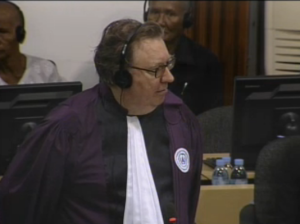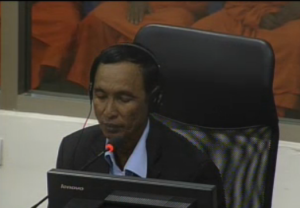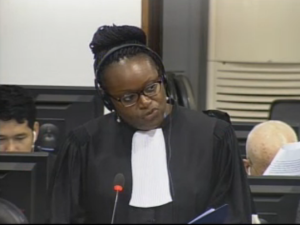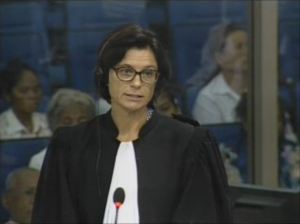Details on Kampong Chhnang Airfield Construction Site
Witness Nuon Trech concluded his testimony today. He mainly provided information about the work and living conditions at Kampong Chhnang Airfield worksite. After the conclusion of his testimony, oral submission with regards to the admission of documents and witness Sar Sarin were heard. Civil Party Sar Sarin testified on November 8 of this year under questioning of the Civil Party lawyers and the Co-Prosecution, but now submitted that he did not want to testify anymore.
Kampong Chhnang Airfield

International Senior Assistant Prosecutor Dale Lysak
The Co-Prosecution continued their examination of witness Nuon Trech. Senior Assistant Prosecutor Dale Lysak turned back to the Kampong Chhnang Airport Site. Mr. Lysak asked about the statement in his interview that “a lot of people died because there were explosions every day.”[1] The same transcript was translated by one of the defense teams that he saw workers who were gravely injured and did not know whether they died in the end. He replied that workers were wounded and far from the provincial town. Mr. Lysak inquired whether he was ever asked by his supervisors to treat wounded soldiers. He answered that he did not have any right to be a medic, as he was considered a prisoner and had to break rocks. There were mixtures of other units: regiments, battalions and companies were under Division 310. He only knew the people in his battalion. They were told to remove the grass and compact the ground. They used mainly workers and a few trucks to carry the rocks. They had to transport them less than one kilometer. Workers received two meals per day. The food ration was one bowl of rice mixed with banana. There was more banana than rice.
When Mr. Lysak asked about the living conditions, Nuon Chea Defense Counsel Victor Koppe interjected and said the witness could only testify to his own experience and the people surrounding him. They worked from 4 am until 11 am. They had a break for an hour and then worked from 12 pm until 5 pm. They worked every night from 6 pm until 10 pm. There were lights installed. Mr. Lysak asked why he had said that he worked hard, because he was afraid of being punished.[2] He replied with a metaphor they were told: “if someone put an arm or a leg into the turning wheel”, their arm or leg would be broken – they had to ensure that the work was not hindered. While he was at Kampong Chhnang, they were allowed to stay near the airfield site. The chief told them that they had to strive hard to work hard. With this, Mr. Lysak concluded his line of questioning.
Divisions and Battalions

Witness Nuon Trech
Civil Party lawyer Hong Kim Suon from Cambodia Defense asked whether his unit was a military or civilian unit when Phnom Penh fell. He replied that he was a military medic at the time and that his unit was not civilian. The Civil Party lawyer inquired why the wife of Oeun was arrested. Mr. Koppe said that the implication was wrong, as the record showed that she was the wife, but that this was not necessarily the reason for her arrest. The witness replied that they said that the North Zone and Division 310 soldiers as well as people from the East Zone were traitors. Mr. Trech also witnessed the arrests of the wives. A person was arrested together with his wife. All soldiers working on the farm were single. In the battalion, only a few got married.
He was around 20 years old and did not know what KTB was.[3] “They came and they made mention of the notion.”
He never saw any other leaders than Ieng Tirith, such as Nuon Chea or Khieu Samphan.[4] He only heard of their names. His supervisor was arrested first, before the witness was arrested. Others were dispersed, but he did not know where they were sent to.
Back to Kampong Chhnang
Turning to Kampong Chhnang Airfield construction site, Mr. Kim Suon asked whether there were shelters. He replied that there was a long hall with a thatched roof that was partitioned. There were sheets on the floor. They had enough water to drink, but not enough water to wash themselves. “Sometimes we would not have water for two days.” The medicine was limited and those who suffered serious conditions were sent to Kampong Chhnang. “We would be diagnosed properly by the medics, because they were afraid that we pretended to be ill. When we were not seriously sick, we would still try to go to work although we were exhausted. We understood that the place was for refashioning, that’s why we had to work hard.” They would allow them to briefly take a rest if they had a fever, for example. One of his colleagues collapsed and was sent to the hospital. He did not know whether he died. “The workers there were skinny.”
Mr. Kim Suon asked where the people were sent to. “It was said that Angkar had pineapple eyes,” the witness replied. He did not see children at the worksite. However, there were adolescent soldiers of 17 or 18 years. They were not allowed to speak to one another. There were meetings. Some people were called out. The others were told that they wer sent to another location. He never saw the others again. With this, Mr. Kim Suon concluded his line of questioning.
Questions by the Khieu Samphan Defense Team
The floor was handed to the Khieu Samphan Defense Team. Counsel Anta Guissé asked whether he knew if a civilian or military airport was constructed. He answered that he was not aware of it. He was told that it was built for war aircrafts. His direct supervisors were all soldiers. Ms. Guissé asked whether he knew which divisions or regiments came from. He replied that it was a mixture of people from different divisions. He was not familiar with the other regiments. He did not know where the people learned the skill to ignite the dynamite.

Khieu Samphan Defense Counsel Anta Guissé
Ms. Guissé asked whether it was a military or civilian hospital.[5] He answered that the hospital was supervised by a division of the Southwest. He was hospitalized. They would be sent to the hospital when found that they were seriously sick.
They were divided into different groups and ordered different assignments. They ate in their group during their breaks. Ms. Guissé asked when he was reassigned. He replied that in 1978 they were told that the Vietnamese attacked the country and that all workers at Kampong Chhnang were seen as refashioned and no longer seen as offenders. Thus, they had to counter the invasion of Vietnamese troops. This was during the “big flooding season” in 1978. They were assigned to fight in Memot. They were on a speedboat and disembarked. When they arrived at Suong, he was assigned to work as a medic attached to the army. He saw many workers from Kampong Chhnang Airfield at a school at Ta Khmao.
The president thanked Nuon Trech and dismissed him.
Oral Submissions and Responses
Next, oral submissions were heard regarding the admission of documents for the testimony of expert 2-TCE-1062. The expert was scheduled for 14 December 2016. The floor was handed to the Co-Prosecutors to make oral submissions. Mr. Lysak said that three documents had been obtained by the Chamber itself through the expert and that they had not been available before, but “clearly relevant”. The third document was an interview conducted with Him Huy. He therefore submitted that it was relevant.
Judge Jean-Marc Lavergne inquired whether the documents were available in French and Khmer. Mr. Lysak confirmed this. The Civil Party Lead Co-Lawyers relied on the Chamber’s wisdom. Mr. Koppe said they had no objection to the admission of the three documents. The interview with Him Huy was relevant to assess the methodology used by the expert. Ms. Guissé submitted that the interview with Him Huy did not provide new information.
Judge Nonn then asked for submissions with regards to the testimony of Civil Party Sar Sarin, who had been questioned by the Civil Party lawyers on 8 November 2016 but had not conclude his testimony. Sar Sarin no longer wished to testify and as he was a Civil Party he could not be compelled to testify. Mr. Koppe said that Sar Saroeun had also be summonsed in Case 002/01 but then decided not to testify anymore. He had now answered questions by the Co-Prosecutors and Civil Party Lawyers. A WESU report indicated that Sar Sarin did not want to testify “if he is not granted to live in third countries.” Sarin had sought support by the tribunal to appeal to the diplomatic core and non-governmental organization in Cambodia. WESU had said that Sarin was not able to develop an objective basis for his fears. He had requested for assistance to “seek asylum”, but had not sought protective measures. He had stated that he was afraid of reprisals of former Khmer Rouge officials. Mr. Koppe said that they fully supported WESU’s rejection of the request, as there were no reasons to support this. However, the question was what to do with the evidence that had been laid before the chamber. Most of the evidence was irrelevant in Mr. Koppe’s view. However, one subject was important: whether former Lon Nol officials were killed in the East Zone. “He is the first ever witness to appear in this court room to give evidence on possible executions of former Lon Nol soldiers and officials in the East Zone.” Ben Kiernan submitted that there was no reason for assuming that Lon Nol officials were executed in the East Zone.[6] If he was correct that these alleged executions took place, this would be a reason to summons the commander in the region Uk Bunchhoeun who was, in Mr. Koppe’s view, responsible for these executions.
Mr. Koppe submitted that there were no valid reasons for Sarin to ignore a summons by the Chamber. If he was not to testify, the evidence should be crossed out from the chamber.
Ms. Guissé said the Khieu Samphan Defense Team had “an even more radical position” than the Nuon Chea Defense Team. “You simply cannot take it into account at all.” If the defense had not had the opportunity to cross-examine the Civil Party, they could not challenge the evidence. Time had been lost with this Civil Party.

International Lead Co-Lawyer Marie Guiraud
Mr. Lysak responded to the two Defense Teams. It was a “legally complicated issue” and wondered why it was brought up orally. “This is a very unfortunate situation,” he said. He clarified that Sar Sarin was not summoned, as the Chamber had deemed that they were under no authority to compel the person to appear. His statement in front of the court had to be treated as an out of court statement. This gave his testimony limited weight and could not be used with regards to the role of the accused. International Civil Party Lead Co-Lawyer Marie Guiraud said that she had no doubt that the chamber would apply the proper conditions. In her view, it was impossible to force the Civil Party to come and testify. However, it was not possible to simply erase the testimony. It was part of the hearing transcripts.
Judge Fenz requested the bench to confer for a few minutes before entering a more detailed discussion. After a few minutes, Judge Lavergne asked whether Sar Sarin’s lawyer was in contact with him and what he intended to do. Ms. Guiraud said that the telephone conversations were available and that they were in contact. They could contact his lawyer Ven Pov during the break. She was unable to say whether he wanted to remain a Civil Party.
Mr. Koppe replied that his understanding of the Supreme Court Chamber’s judgment was that materially the Civil Party was “materially a real witness.” Ms. Guissé said that it was legally speaking really clear to her that a Civil Party “has never been obliged to testify before any court whatsoever.” The chamber had dropped the Civil Party and did not intend to hear the Civil Party. The chamber should not use the statements in the decision.
The president thanked the parties for their submissions. He asked the parties for written submissions on this matter. Ms. Guissé asked what the chamber’s reasoning was to guide them what they should focus on in the submissions. The president clarified that he had not signed the removal of the Civil Party – the word “remove” did not appear in the Khmer version. It was important to determine whether the evidence provided by him could be used in the judgment. The Trial Chamber adjourned. It will resume on Friday, December 9 2016, at 9 am with the testimony of witness 2-TCW-971 via video link from Oddar Meanchey Province. Tomorrow, a trial management hearing will be held.
[1] E3/7537, a 0019648 (KH), 00291006 (FR), 00251256 (EN).
[2] E3/7537, at 00019649 (KH), 00251256 (EN), 00291007 (FR).
[3] At 00019645 (KH), 00251253 (EN).
[4] At 00019644 (KH), 00251252 (EN).
[5] E3/7877.1, at 01358654 (FR), 01357613 (KH).
[6] E3/1593.
Featured image: Witness Nuon Trech (ECCC: Flickr).

[…] Trial Chamber President Nil Nonn inquired about Civil Party Sar Sarin’s status. National Civil Party Lead Co-Lawyer Pich Ang informed the Chamber that Mr. Sarin wished to retain his Civil Party status (see discussion here.) […]